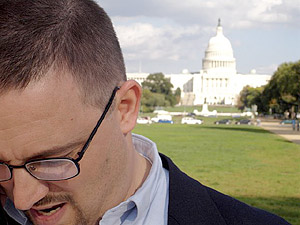
I went out to DC from Chicago for the inaugural event for Jim Bennett�s Anglosphere Institute. (The Institute�s website is currently under construction, but has some interesting things on it.)
The first event was the lecture I mentioned in this earlier post by Claudio Veliz, author of The New World of the Gothic Fox: Culture and Economy in English and Spanish America. The lecture was at the Hudson Institute.
I understand that the full text of Prof. Veliz’s talk will be online at some point, both audio and text. Prof. Veliz discussed the points raised in his book, specifically that the English and Castilian (rather than British and Spanish) cultures were the greatest exporters of culture of any of the European countries. He focused on the extraordinary fact that the English have exported their culture to the ends of the Earth to a degree unmatched by any other people. The main one is of course the Industrial Revolution, which began in England, and has in one way or another spread throughout the whole world and shows no sign of stopping or slowing down. Another is democratic government, though in most cases this is merely an aspiration or a fraud. Prof. Veliz focused in some detail on the example of soccer. Of course people have been kicking balls around for millennia. But only in England did organized teams with rules and their own buildings and groups of fans identifying with the team come into being. This phenomenon is now global. Terms like �sport� and �fair play� did not exist in other languages, they came from England.
He also answered the question �so what?� with regard to the ubiquity of English-derived, and American-derived �creatures� � i.e. cultural artifacts. He noted, following the thinking of Vico, that �what we do matters�. In other words, what we do becomes what we are, it changes us. Culture is a whole and each part carries something of the whole. The adoption of English-derived cultural forms has changed the consciousness of the world in many ways, not all of them discernible. He noted also that the spread of English-derived cultural �creatures� has occurred in large part because it was the fact that they came from a culture � the first ever � with a large, wealthy working class. It was and is the vulgarity, in the strict sense, which gives it its global appeal. I might have said demotic rather than vulgar, but Veliz was right to speak as he did. The �vulgarity� of much of our culture is the source of its appeal, but also of the hostility it provokes on the part of people who are exposed to it and don�t like it. This too is an old phenomenon. Veliz went on to say that people in other countries often want to have a sanitized version of modernization � antibiotics and indoor plumbing and computers which only contain and transmit wholesome things, without music videos or sugary soft drinks or Internet porn. But, Veliz insists, you cannot have modernization without the cultural baggage, as a practical matter, you are stuck with the whole package.
This led to his conclusion, which he left as an open question. Will the English speaking world die out? What could cause it to fade away as the prior culture-forming civilization of Greece died out, giving rise to a Hellenistic successor civilization? He seemed to believe that there is nothing in the world that is a mortal threat from outside the Anglosphere (a word he did not use). Rather, the danger is from a lack of understanding and a lack of cultural confidence within the Anglophone world. In other words, the danger is not conquest from without but suicide from within.
Please note the foregoing is my recollection, done without notes. I look forward to the actual transcript.
Following the lecture there was a dinner party for supporters of the Anglosphere Institute, which was very enjoyable. I got a chance to chat with Professor Veliz. I also got to meet one of my favorite writers, Michael Barone, and got my books autographed. In addition, prior to the lecture, I got to spend some time with Jim Bennett, who has several interesting Anglosphere-related projects in the works, which he will announce in due course.
The next day I met up with Jonathan, and we visited the Air and Space Museum, and briefly, the National Gallery. The National Gallery is clearly an extraordinary museum, and I will make a point of returning to it. An unnecessarily rude guard at the door was the only indication that it is a government-run entity.